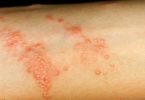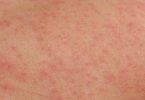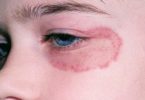What's in this article?
 Dry Skin Overview
Dry Skin Overview
Ordinarily, dry skin isn’t serious, but it can be uncomfortable and unsightly, creating fine lines and wrinkles.
Serious dry skin conditions an inherited group of disorders called ichthyosis can sometimes be disfiguring and upsetting. Fortunately, environmental factors that can be at least partially controlled cause most dry skin. These factors include hot or cold weather, low humidity and soaking in hot water.
Chronic or severe dry skin problems may require evaluation by a doctor who specializes in skin (dermatologist). But first you can do a lot on your own to improve your skin, including using moisturizers and avoiding harsh, drying soaps.
Dry Skin Facts
♦ Dry skin is a very common condition that causes small fine flakes and dry patches.
♦ Itching is one of the most common symptoms of dry skin.
♦ Scratching may be hard to resist.
♦ Dry skin is more common in colder winter months and drier climates.
♦ The elderly are more prone to dry skin than younger people.
♦ Dry skin is more common in individuals with a history of eczema.
♦ Dry skin may rarely be a side effect of medications.
♦ Dry skin is more common in those with hypothyroidism.
♦ Repeat itch-scratch cycles may lead to skin thickening and darkening.
♦ Possible complications include rashes, eczema, and bacterial infections.
♦ Extremely dry skin can cause cracks and breaks in the skin.
♦ Medications including topical corticosteroids and oral antihistamines can help ease itching.
♦ Secondary infections may result from scratches and skin breakdown.
♦ Topical or oral antibiotics may be necessary for secondarily infected dry skin.
♦ Several home remedies, such as decreasing bathing frequency and lubricating the skin with moisturizers after showers, can help control and prevent dry skin.
Your skin is your body’s first line of defense against the elements. When sun, wind and cold leave skin dry and itchy, don’t hide it under long pants and gloves.
Winter Weather
When the temperature drops, the humidity level plunges too. Dry air leaves skin parched. “Once the weather starts to change, I see patients coming in complaining of dry, itchy skin,” says Linda Stein Gold, MD, clinical research director for the dermatology department at Detroit’s Henry Ford Hospital.
Turning up the thermostat doesn’t help, either. Indoor heating strips even more moisture from the air and your skin.
Quick Fix: Dial Up the Humidity
Install a humidifier in your home to keep air moist. Set humidity at a constant 45% to 55%, and the temperature at a balmy 68 degrees Fahrenheit.
Before you go outside in wintry weather, create your own moisture barrier. Protect your most sensitive parts lips, face, and hands with a scarf and gloves.
Steamy Showers
Setting the shower to steamy soothes your body, but it won’t do your skin any favors. “I know it feels wonderful to stand in a really hot shower… but it can dry out the natural oils in our skin more quickly,” Stein Gold says.
Standing under that hot spray long enough to belt out your favorite tune is also a no-no. The longer you linger in the shower, the more you dry out your skin.
Quick Fix: Cleanse Coolly and Quickly
Dial down the shower temperature to lukewarm, and keep showers short. Five minutes is enough to get clean without over-drying. Save the singing for your car.
Moisture-Robbing Soaps
Don’t put just any bar of soap into your shower dish they’re not all the same. Wash with a harsh soap and you’ll send your skin’s natural moisture barrier straight down the drain.
Quick Fix: Go Mild
“We recommend using a mild, fragrance-free soap that moisturizes as it cleanses,” Stein Gold says. Bar or liquid doesn’t matter, but choose a soap that’s specially formulated for dry skin.
The Rub-Down
Think you need to scrub your skin to get it clean? Toss that old notion, along with your scrubby sponge.
“Friction strips the skin and enhances the dryness,” says Nanette Silverberg, MD, a dermatology professor at Columbia University.
Quick Fix: Go Soft
Use your hands or a soft washcloth instead, Silverberg suggests. They’ll get you just as clean as abrasive sponges, without roughing up your skin.
Losing Shower Moisture
Showering bathes your skin in moisture. Scrubbing off with a towel right afterward strips that moisture away. “The surface of your skin absorbs some of the water, which will be lost if you don’t seal it in,” Silverberg says.
Quick Fix: Lock in Moisture
“I recommend that you towel-dry off but still leave the skin a little bit moist,” Stein Gold says. Apply moisturizer to still-damp skin, she suggests.
What kind of lotion should you use? Rub on a rich cream containing ingredients such as soothing ceramide for sensitive skin, or urea, lactic acid, dimethicone, or petroleum jelly (petrolatum) for very dry skin. These products “will seal moisture into the skin and create an effective skin barrier,” Silverberg says.
Your face needs different moisturizing than your body. Smooth on a noncomedogenic face lotion one that won’t clog pores and cause breakouts. Pick a moisturizer that incorporates a sunscreen with an SPF of 30 or more. “Moisturizer with sunscreen addresses both dryness and sun protection,” Silverberg says.
Aging
As hormone levels change over the years, skin becomes thin and parched.
Quick Fix: Smooth Out the Years
You can’t turn back the clock, but you can minimize aging skin changes. Start each morning with a generous rub of a rich face and body cream. To minimize wrinkles while you relieve dryness, look for ingredients such as alpha-hydroxy acids and retinol.
Not in the habit? Keep a bottle of lotion next to your bed so it’s the first and last thing you see each day.
Irritants
Is your favorite sweater making you itch? It could be the fabric, fabric softener, or the detergent you’re washing it in. Lots of everyday fabrics and products can irritate skin from dryer sheets to perfume.
Quick Fix: Set Products Free
“Free” is the key word when buying any type of cleaner or beauty product. Pick products that are labeled fragrance- and dye-free, and that are specially formulated for sensitive skin.
Wear clothes made of soft, natural fabrics cotton and silk instead of wool or polyester. Line your bed with cotton percale sheets for a gentler touch while you sleep.
Your Health
Is your skin especially scaly and red? It could be a skin condition, like atopic dermatitis or psoriasis. It can also be a symptom of diseases such as diabetes or an underactive thyroid gland.
Quick Fix: Target Treatment
When dry, red skin won’t go away, see your doctor to discover and treat the cause. The solution may be as simple as taking a medication or using a prescription cream.
No matter what the cause, dry, itchy skin isn’t something you should have to live with long-term. If you’ve tried a few different moisturizers and they’re not helping, or the irritation is getting worse, see your dermatologist.





